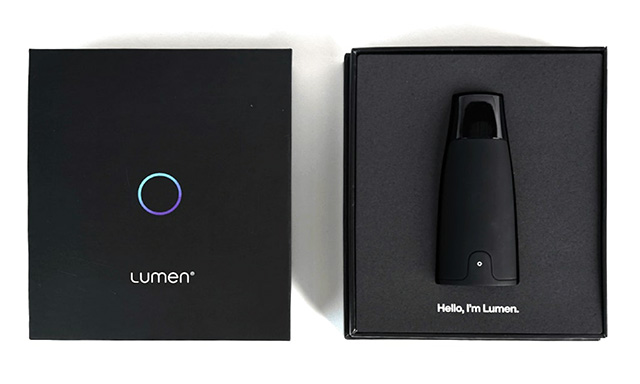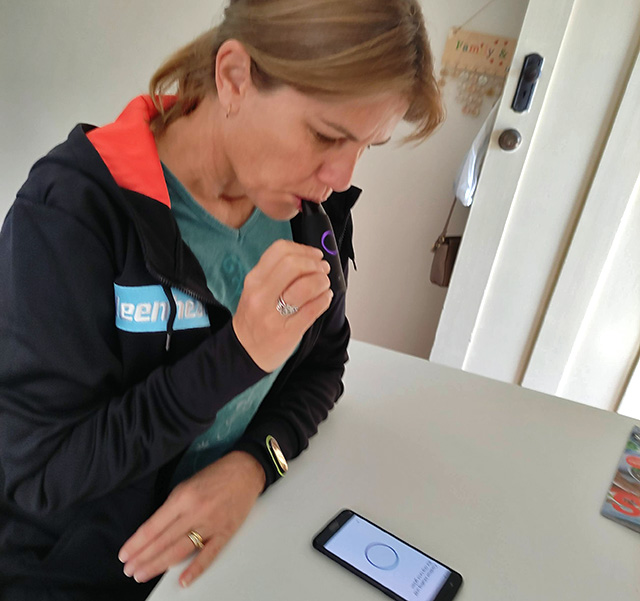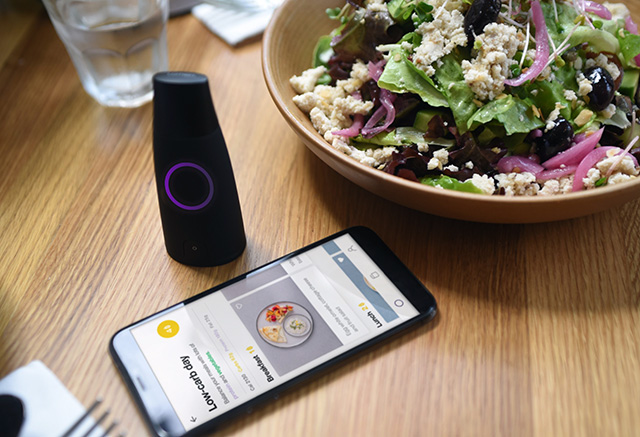The Lumen is a hand-held metabolic breath analyzer. From a single breath, it can determine if you are using fats or carbohydrates for fuel. This lightweight device provides information that in the past would have required large expensive equipment, and taken much longer to achieve.
What you get
When you receive your lumen, you will be impressed. The packaging is very stylish, the device comes in a lovely sleek black box. It includes a gorgeous color scheme, with all the information you need to get started. The hand-held device itself is really compact, soft to touch and very light in the hand, with a hygienic lid for placing over the mouthpiece, and a charging pod. You need to download an app to your mobile device, which is used to record your results and track your progress over time.
 The lumen packaging is very stylish
The lumen packaging is very stylish What does it do?
The Lumen claims to be “assisting you to master and improve the health of your metabolism”, or to improve fitness by “hacking” your metabolism. Metabolism is the chemical reactions in the body’s cells that change food into energy. The device uses indirect calorimetry to measure one of the products of this cellular metabolism, the carbon dioxide (CO2) in the air we breathe out. From this CO2 value, it can estimate the type of fuel your body is using to produce energy. After tracking this measure over time, you can get a score of "metabolic flexibility", and advice is given to help you "hack your metabolism".
How it works
According to their website, the Lumen measures "the CO2 in your breath through the sensor and flow meter, based on the RER metric". The Respiratory Exchange Ratio (RER) is the ratio between the volume of CO2 being produced by the body and the amount of O2 being consumed.
The Lumen determines the volume of CO2 in the breath based on the CO2 concentration in a standard volume of air blown through the apparatus. This value can then be used to indicate the type of fuel your body is using to produce energy. An RER value is usually between 0.7 and 1.0, though the Lumen uses a more user-friendly scale of 1 to 5, with a high CO2 level (5) indicating carbohydrate burning and low CO2 level (1) indicating fat burning.
 taking a reading after exercise
taking a reading after exerciseIs it accurate?
A study by Lorenz et al. (2021) found that the Lumen was valid for detecting changes in metabolic fuel utilization compared with a laboratory metabolic cart. The standardized procedure you follow when using the device helps with reliability. If you don’t use the device correctly, such as blowing too hard or too little air, it disallows the measure. It also usually averages two measures to get a more reliable result.
Using the Lumen
The Lumen app encourages you to test yourself regularly, initially to determine ‘your unique metabolic profile’, but mainly in the morning to set up your nutrition plan for the day. You can also choose to monitor before and after exercise or around eating times to check what your metabolism is running on.
There are three different programs you can choose depending on your goals;
- Metabolic Health
- Healthy Weight loss
- Fitness Performance
Choosing a different goal will change the nutrition plan that is recommended for you. When doing the morning measure you record sleep, steps, carbohydrate serves, and activity. The focus for the program is on macro-nutrient composition, rather than the total energy of intake. So the nutrition plan is based around carbohydrate serves for the day, based on your morning reading of carbohydrate burning. Then protein and fat amounts are calculated around that. You can also get more serious and record your diet in much greater detail using food labels or even weighing food.
 nutrition plans are recommended to you
nutrition plans are recommended to you Feedback
I have been using the lumen for several weeks now, and I’m happy to share my experiences and feedback.
This buzz word of ‘metabolic flexibility’ is actually defined by the ability of the body to switch fuels for oxidation in response to changes in the macro-nutrient composition of your diet. Your metabolic flexibility may not be something you can change. So when Lumen talks about hacking your metabolism, I am not sure I agree with the terminology. Your body will metabolize, or use, whatever you are fueling it with. For example, if you are fueling your body mostly on carbohydrates your body will use glucose predominantly as fuel, and vice versa if you are eating a greater proportion of fats your body will adapt and burn more fat. Perhaps tracking metabolism rather than hacking metabolism is a more appropriate term, and creating the ability for people to understand how their diet is affecting their fuel usage, and how to modify the diet to help switch from carb-burning to increased fat burning.
I often hovered around the 3-4 zone for the test taken in the morning, with the measure dependent on my previous day’s carbohydrate load and the meal the night before. If you score too high on the carb-burning in the morning (4-5), the nutrition plan usually allocates a lower number of serves of carbs, and recommends higher protein and fats. It is also suggested that longer fasts will give you a better chance of fat burning.
I admit I never really did any serious fasting other than overnight for 12-14 hours, mostly due to it being impractical for my lifestyle. I did have a couple of really low carbohydrate days (as suggested) but disappointingly I was unable to get right down into the fat-burning zone at any time.
Despite reducing my carb intake, I continued to get the advice to eat fewer carbs. For me, this is hard as I am traditionally a moderate to high carbohydrate eater. Potentially, if I went more days with low carbohydrates I may have got there, but this wasn't practical or easily done with my family of carbohydrate lovers who need to be catered for in the meal plans. Plus I was reluctant to go further, because the days of very low carbs are very challenging! And is that really necessary for health?
I have always been weight stable, and I am not looking to drop weight, although while using the lumen I incidentally dropped 2kg, (obviously due to not only the reductions in carb intake, but the increase in low calorie-dense foods like vegetables). Being a dietitian, I usually balance my diet for health, manage my weight well with diet and exercise, and am reluctant to think I need to reduce carbs, especially if they are unprocessed carbs, and increase fats to burn more fat. However, such advice may suit many others with less nutrition and health knowledge. If you are keen to reduce fat stores and weight, then this could be a great way to achieve that.
Summary
The Positives:
- Gives people a better understanding of metabolism and how it works.
- Lots of great tips and information.
- Heaps of nutrition guidance if you want to delve this far into it, but you can also just skim over this part, though you probably won’t get the same benefit from using it.
- You can connect to your own fitness apps to upload data (like Google fit, MiFit, Apple fit etc.) and track activity levels more closely.
- Very easy to carry around and test at any time.
- Lots of support through emails and online resources, and nutrition plans to help you along the path to health.
The Negatives:
- Cost can be prohibitive for some.
- Constant measuring becomes a little bit arduous and time-consuming, however, doing it once a day only is fairly easy to fit into your day.
- The nutrition plan is based on the morning measurement, and generally pushes you towards lower carbohydrate eating to enhance fat burning, even without understanding the activity level for that day. It gives a nutrition plan based on the day you've just had, rather than the day you are about to have. If you test regularly though, it will adjust your nutrition plan for extra activity done during the day.
- Most measurements can be switched from imperial to metric, however, calories are used for measurements of food energy, which can be confusing for us Aussies that use kilojoules! (The focus is certainly not on kJ or Kcal, but on macros anyway).
What I do know after years of practising as a dietitian, it is really difficult for people to change their dietary patterns after years of ingrained eating habits. Motivation is hard to come by and this tool adds another way of achieving this, particularly if intrinsic motivation is failing. Overall, Lumen certainly has more positive qualities than negative.
I highly recommend the Lumen as a very good educational tool to assist people to become more aware of their health and the food they eat, and to make sound changes to their diet to improve it.
You can read more about this device, and buy your own Lumen, from here. If you use the promo code code topendsports you can get $25 off.
Further Reading
- Deng Y, Scott BJ (2019) Comparison of Resting Metabolic Rates: Calculated using predictive equation and measured using Portable Indirect Calorimeter. Glob J Obes Diabetes Metab Syndr 6(1): 010-016.
- Lorenz KA, Yeshurun S, Aziz R, Ortiz-Delatorre J, Bagley JR, Mor M, Kern M. A Handheld Metabolic Device (Lumen) to Measure Fuel Utilization in Healthy Young Adults: Device Validation Study. Interact J Med Res. 2021 May 17;10(2):e25371. doi: 10.2196/25371. PMID: 33870899; PMCID: PMC8167606.
note: a Lumen device was provided to Topend Sports for free for us to create this review
Related Pages
- More Health Product Reviews
- Measuring resting metabolism using Indirect Calorimetry
- All about the respiratory exchange ratio
- The Future of Fitness Testing — technology helping assess the athlete
- Fitness Tests for Health


 Current Events
Current Events